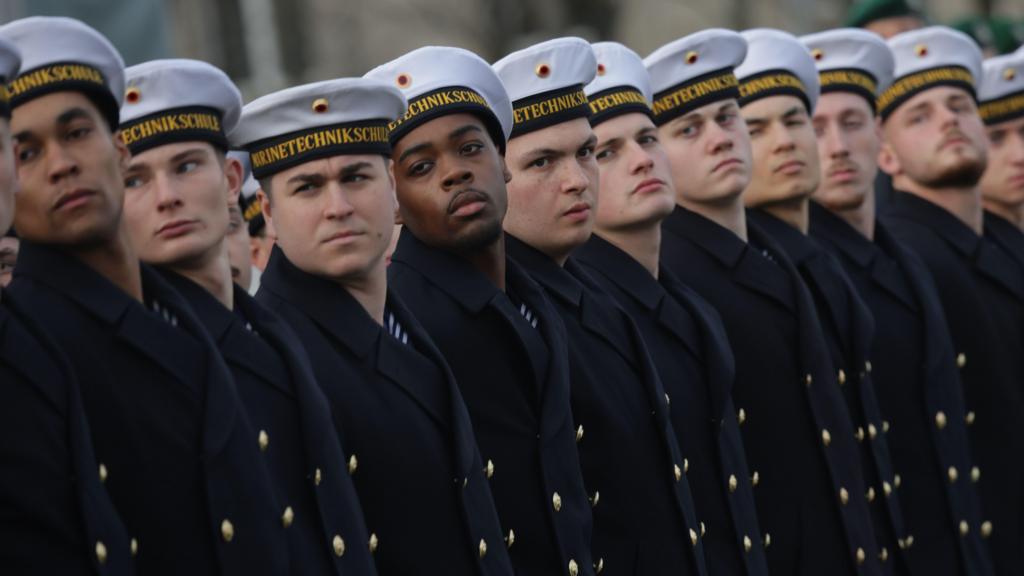“`html
Germany’s coalition government has reached an agreement on a new military service plan, aimed at bolstering troop numbers after extensive negotiations between political factions.
Under the revised plan, all 18-year-old men will be required to complete a questionnaire assessing their suitability for military service and, beginning in 2027, undergo medical screenings.
This decision aligns with Berlin’s objective of establishing the strongest conventional army in Europe.
Armin Papperger, CEO of Rheinmetall, Germany’s largest defense firm, stated in an interview with the BBC that he believes this goal is attainable within five years.
Papperger affirmed that Chancellor Friedrich Merz’s ambition to strengthen the Bundeswehr is “realistic,” noting that “clear decisions” are being made by the government.
Earlier this year, German Defense Chief Gen. Carsten Breuer cautioned that the Western NATO alliance must prepare for a potential Russian attack within the next four years.
While acknowledging he possesses “no crystal ball,” Papperger concurred that Germany must be “ready in ’29.”
Upon forming their coalition earlier this year, Merz’s conservative CDU/CSU and the center-left Social Democrat SPD agreed to reinstate military service, initially on a voluntary basis.
The Bundeswehr currently comprises approximately 182,000 troops. The new military service model seeks to increase this figure by 20,000 within the next year, with a further rise to between 255,000 and 260,000 over the next decade, supplemented by roughly 200,000 reservists.
Starting next year, all 18-year-old men and women will receive a questionnaire to gauge their interest and willingness to join the armed forces. Completion will be mandatory for men and voluntary for women.
From July 2027, all 18-year-old men will also be required to undergo a medical examination to assess their fitness for duty.
Should the government’s objectives not be met, parliament may consider a form of compulsory enlistment. In the event of war, the military could utilize the questionnaires and medical exams to identify potential recruits.
However, elements within Germany’s political left remain strongly opposed to mandatory service.
Many young Germans harbor reservations, with a significant majority opposing conscription. A recent Forsa survey for Stern magazine indicated that while slightly over half of respondents favored compulsory service, opposition rose to 63% among 18- to 29-year-olds.
“I don’t want to go to war because I don’t want to die or be shot at,” stated Jimi, a 17-year-old student from Berlin who participated in an anti-conscription protest outside the Bundestag earlier this week. “I also don’t want to shoot people.”
He characterized an attack against Germany as an “unlikely and abstract scenario” that the government is leveraging to legitimize “stealing millions of young people’s right to decide what they should be doing.”
Conversely, 21-year-old Jason enlisted as a new Bundeswehr recruit earlier this year, citing the current “security situation.”
“I wanted to contribute to defending peace, to defending democracy if the worst happens,” he explained. By enlisting, he felt he was “giving back to society” and also believed in the army’s deterrent potential, “so potential enemies don’t even think about attacking you.”
Defense Minister Boris Pistorius has sought to reassure the public, stating that despite the new military service plan, there is “no cause for concern… no reason for fear.”
“The more capable of deterrence and defense our armed forces are, through armament, training, and personnel, the less likely it is that we will become a party to a conflict at all,” Pistorius asserted.
Defense spending in Germany declined after the end of the Cold War, and conscription was suspended in 2011.
Given its history, Germany has traditionally been hesitant to project military strength. However, following Russia’s full-scale invasion of Ukraine, Friedrich Merz declared earlier this year that the guiding principle for German defense “now has to be whatever it takes.”
NATO countries across Europe have faced pressure from President Donald Trump’s White House to increase defense spending.
European re-armament efforts have translated into significant revenue for Rheinmetall.
Its CEO, Armin Papperger, whose firm also supplies Ukraine, stated: “We make a lot of money because there is a huge demand.”
“We have to grow strong on vehicles, on ammunition, we have to have our own satellite competencies. We do much more on the electronics and artificial intelligence… than ever before,” he added.
A US report last year suggested that Papperger had been the target of a Russian assassination plot. While there was no confirmation at the time, Papperger declined to comment on the report, stating: “I feel good, I feel safe.”
When asked whether he believed Europe was in a state of cold or hybrid war, he replied: “Whatever you call it, it’s not a peaceful time.”
Plans to re-introduce military service have been thrown into chaos because of an 11th hour disagreement.
The UK and other allies hope to obtain clear US backing for their efforts to shore up Ukraine’s defences.
Steve Witkoff said Russia agreed in Alaska that the US and Europe could provide Ukraine with a Nato-style guarantee.
Merz was visiting the UK to boost defence ties with Germany, as part of a historic friendship treaty.
It comes as Friedrich Merz makes his first official visit to the UK as German chancellor.
“`

